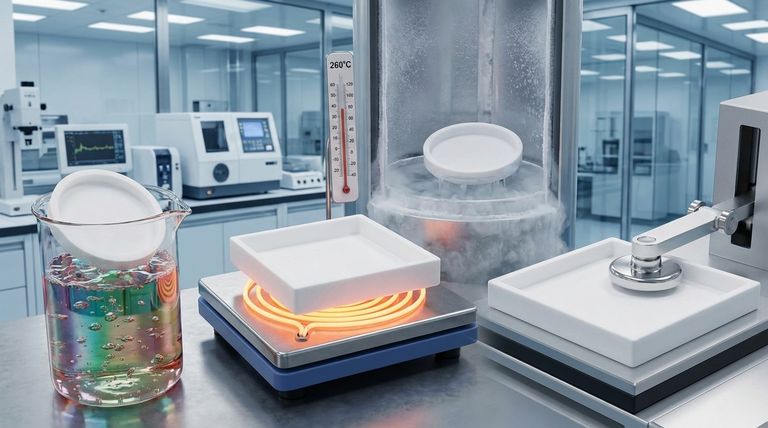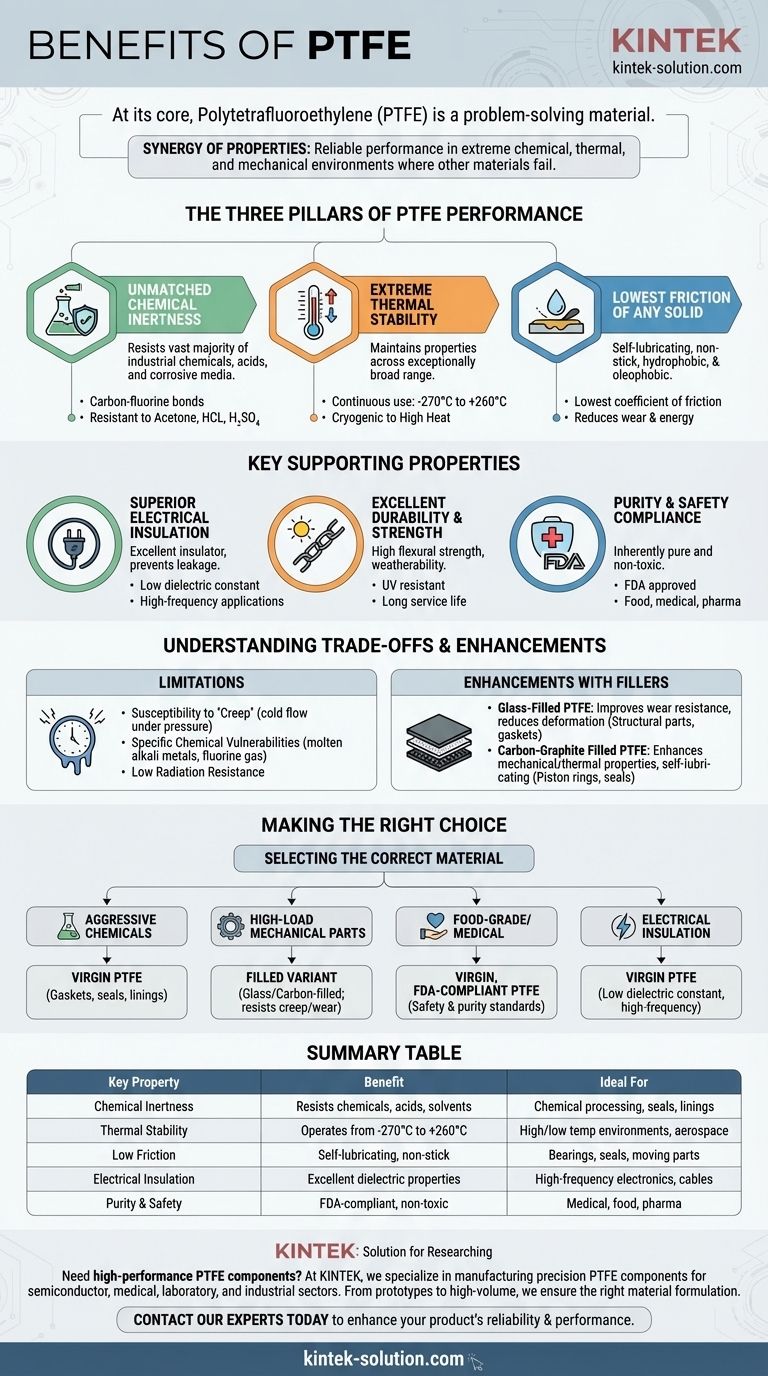At its core, Polytetrafluoroethylene (PTFE) is a problem-solving material. It is specified for applications where other polymers fail, primarily due to its remarkable combination of three key properties: an extremely low coefficient of friction, near-total chemical inertness, and a very wide operating temperature range. This unique profile makes it indispensable across demanding industries from aerospace to medicine.
The true benefit of PTFE isn't just one of its famous traits, like its non-stick surface. It's the powerful synergy of all its properties, allowing it to provide reliable performance in extreme chemical, thermal, and mechanical environments where almost no other material can survive.

The Three Pillars of PTFE Performance
The value of PTFE is built on a foundation of three defining characteristics. Understanding these is key to understanding where and why to use it.
Unmatched Chemical Inertness
PTFE is one of the most non-reactive substances known. The powerful carbon-fluorine bonds that make up its structure are exceptionally difficult to break.
This molecular stability makes it resistant to the vast majority of industrial chemicals, acids, and corrosive media, including acetone, hydrochloric acid, and sulfuric acid.
Extreme Thermal Stability
PTFE maintains its properties across an exceptionally broad range of temperatures.
It remains functional and reliable for continuous use at temperatures up to +260°C (+500°F) and does not become brittle until it reaches cryogenic temperatures as low as -270°C (-454°F).
The Lowest Friction of Any Solid
PTFE has the lowest coefficient of friction of any known solid material, making it one of the most slippery substances in existence.
This results in a self-lubricating, non-stick surface that is also hydrophobic (resists water) and oleophobic (resists oil). This property is critical for reducing energy consumption and wear in moving parts.
Key Supporting Properties
Beyond its core attributes, several other benefits make PTFE a versatile and reliable choice for engineers and designers.
Superior Electrical Insulation
PTFE is an outstanding electrical insulator with a very low dielectric constant.
This property prevents electrical leakage, making it a first-choice material for high-frequency applications, such as coaxial cable insulation and components in printed circuit boards.
Excellent Durability and Strength
Despite its flexibility, PTFE exhibits high flexural strength and excellent weatherability. It resists degradation from UV radiation and does not break down with environmental exposure, ensuring a long service life.
Purity and Safety Compliance
Virgin PTFE is inherently pure and non-toxic. It is widely approved by the FDA for use in food processing, pharmaceutical, and medical applications due to its inert and clean nature.
Understanding the Trade-offs and Limitations
No material is perfect. Acknowledging PTFE's limitations is crucial for successful application and avoiding mis-use.
Susceptibility to "Creep"
Unfilled, or "virgin," PTFE is a relatively soft material that can be susceptible to creep, also known as cold flow. Under sustained pressure, especially at elevated temperatures, the material can slowly deform.
Specific Chemical Vulnerabilities
While it resists nearly all chemicals, PTFE can be attacked by a few rare substances. These include molten or dissolved alkali metals (like sodium), fluorine gas, and other extremely potent oxidizing agents.
Low Radiation Resistance
Compared to other polymers, PTFE has relatively low resistance to high-energy radiation. This can limit its use in certain nuclear or space applications where radiation exposure is a primary concern.
Enhancing Performance with Fillers
To overcome its inherent limitations like creep, PTFE is often blended with other materials. This creates a composite that retains PTFE's core benefits while improving specific mechanical properties.
Glass-Filled PTFE for Structural Rigidity
Adding glass fibers (typically 5% to 40%) dramatically improves wear resistance and reduces deformation under load. This formulation increases hardness and lowers thermal expansion, making it ideal for structural parts and gaskets.
Carbon-Graphite Filled PTFE for Dynamic Applications
Combining PTFE with carbon and graphite enhances its mechanical and thermal properties while leveraging graphite's self-lubricating qualities. This blend is a standard for piston rings, rider rings, and seals in industrial compressors where low friction and high wear resistance are critical.
Making the Right Choice for Your Application
Selecting the correct material requires matching its properties to your primary goal.
- If your primary focus is sealing aggressive chemicals: Virgin PTFE's near-total inertness makes it an excellent and reliable choice for gaskets, seals, and linings.
- If your primary focus is high-load mechanical parts: A filled variant, such as glass-filled or carbon-filled PTFE, is necessary to resist creep and wear.
- If your primary focus is food-grade or medical use: Ensure you specify virgin, FDA-compliant PTFE to meet safety and purity standards.
- If your primary focus is electrical insulation: PTFE's low dielectric constant and high resistivity are its key advantages for high-frequency electronics.
Ultimately, PTFE is the material of choice when you need consistent performance under conditions that cause other materials to fail.
Summary Table:
| Key Property | Benefit | Ideal For |
|---|---|---|
| Chemical Inertness | Resists nearly all industrial chemicals, acids, and solvents | Chemical processing, seals, linings |
| Thermal Stability | Operates from -270°C to +260°C (-454°F to +500°F) | High/low temperature environments, aerospace |
| Low Friction | Self-lubricating, non-stick, hydrophobic, and oleophobic | Bearings, seals, moving parts, non-stick surfaces |
| Electrical Insulation | Excellent dielectric properties, prevents electrical leakage | High-frequency electronics, coaxial cables |
| Purity & Safety | FDA-compliant, non-toxic, and chemically pure | Medical devices, food processing, pharmaceuticals |
Need high-performance PTFE components tailored to your exact requirements?
At KINTEK, we specialize in manufacturing precision PTFE components—including seals, liners, and labware—for the semiconductor, medical, laboratory, and industrial sectors. Whether you need standard parts or custom fabrication from prototypes to high-volume orders, our expertise ensures you get the right material formulation (virgin, glass-filled, or carbon-filled) to solve your most challenging application problems.
Contact our experts today to discuss how our PTFE solutions can enhance your product's reliability and performance.
Visual Guide

Related Products
- Custom PTFE Parts Manufacturer for Teflon Containers and Components
- Custom PTFE Parts Manufacturer for Teflon Parts and PTFE Tweezers
- Custom PTFE Measuring Cylinders for Advanced Scientific and Industrial Applications
- Custom PTFE Volumetric Flasks for Advanced Scientific and Industrial Use
- Custom PTFE Bottles for Diverse Industrial Applications
People Also Ask
- What is PTFE commonly known as and what are its unique properties? Unlock Unmatched Chemical & Thermal Resistance
- What are the unique properties of PTFE? Unlock Unmatched Performance in Demanding Applications
- What are the base characteristics of PTFE? Unlocking Extreme Performance in Friction, Temperature, and Chemical Resistance
- What are the primary applications of PTFE fasteners and custom parts? Critical Solutions for Extreme Environments
- What are the key benefits of PTFE in custom fabrication? Unlock Performance in Extreme Conditions



















